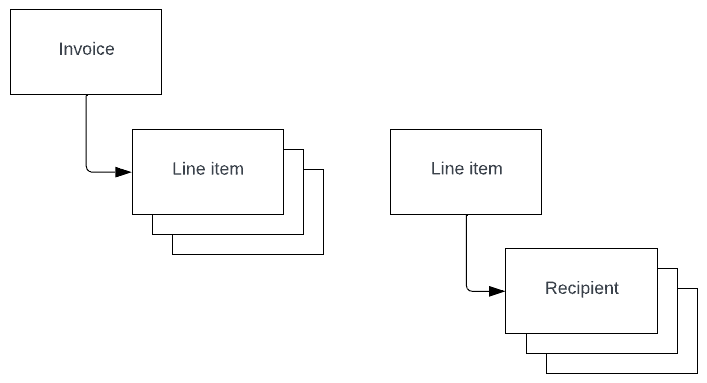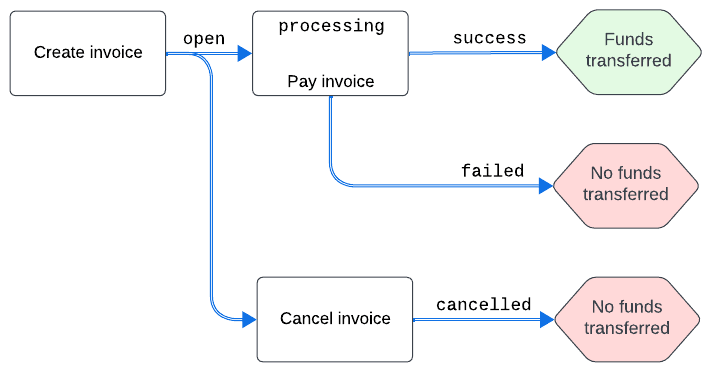Invoices
An invoice is the basis and the record of a Tilia transaction. Tilia supports these invoice types:
- Standard invoice : A standard purchase invoice involves collecting funds from the buyer and transferring them directly to the recipient or seller. Standard invoices work well in standard payment processing applications.
- Escrow invoice : An escrow purchase invoice involves collecting funds from the buyer and holding them in an escrow account, until an agreed-upon condition is met. Once escrowed, funds can either be transferred to the seller, or refunded back to the buyer. Escrow invoices are commonly used with non-fungible tokens (NFTs) and products on a blockchain.
- Virtual token purchase : This type of invoice enables a user to purchase tokens from you for use in other transactions. Tokens can be spent using both standard invoices or escrow invoices.
- Virtual token conversion : This is a special type of invoice that can be used to exchange a user's convertible tokens to fiat currency. Refer to Virtual Tokens for more information.
- Payout : Payout invoices are used to request that funds be transferred from a user's fiat wallet to an external account (e.g. PayPal.) Refer to Payouts for more information.
Tilia supports these transactions from:
- User to user : When the one user pays another user for a good or service. A user-to-user invoice can include user-to-user line items, user-to-integrator line items, and line items with recipients that are users and a recipient that's the publisher.
- User to integrator : When the user pays you, the publisher, for a good or service
Both Standard and Escrow invoices support transactions in tokens or in fiat currency.
See Tilia invoices in action
Our Tutorials walk you through the process of creating invoices for many different transaction types.
Invoice properties
The following diagram shows how the contents of an invoice are organized.

An Invoice contains one or more Line items. The Line items of a User to user transaction can contain one or more Recipients.
Invoice heading
The Invoice contains information that applies to the entire transaction, such as:
-
The invoice's unique ID.
You can use this ID to retrieve the invoice.
For example:
GET https://invoicing.tilia-inc.com/v2/invoice/{invoice_id} - The payer's account ID
- A description of the transaction overall
- The payment methods that provide the funds for the transactions. Payment methods include credit cards, Tilia wallets, and PayPal.
- and other details and metadata about the invoice.
Line item
Each line item contains information about a single item being exchanged in the transaction. Information, such as:
- Product identification such as SKU, product code, purchase price, and other metadata.
- Recipient information (user-to-user invoice only) In a user-to-user transaction, each user to receive payment from the transaction is described individually. Line items in a user-to-user invoice can have recipients that are users as well as a recipient that's the publisher.
In a user-to-integrator transaction, the recipient is the publisher and needs no additional information.
Recipient
Each user to receive funds from the transaction is listed individually in the Line item. This information includes:
- Descriptive information data and metadata that describes the transaction.
- Amount information that describes the currency type and amount the recipient is to receive.
- Funding information that describes the wallet or payment method that provides the funds, and the account or wallet to receive the funds.
Invoice lifecycle
A standard invoice moves through the following states: open, processing, and success.
The following diagram shows the invoice states as an invoice moves through its lifecycle.

If an invoice can't be processed, it is assigned a state of failed.
This could happen, for example, if the user's credit card was declined.
An unprocessed invoice can also be canceled, in which case it is assigned a state of cancelled.
After a week, unpaid invoices sare automatically canceled.
Webhooks
You can use our webhooks to keep track of an invoice throughout its lifecycle. For information about using webhooks, visit Webhooks.
